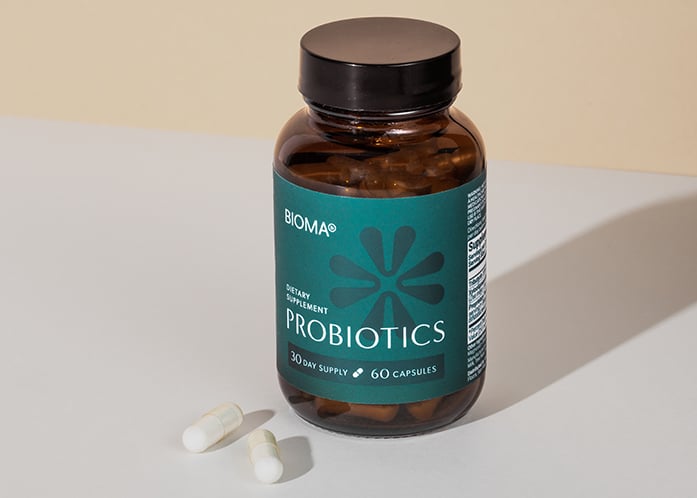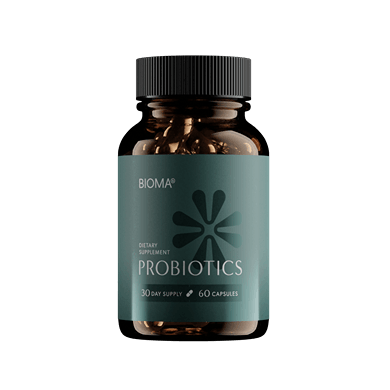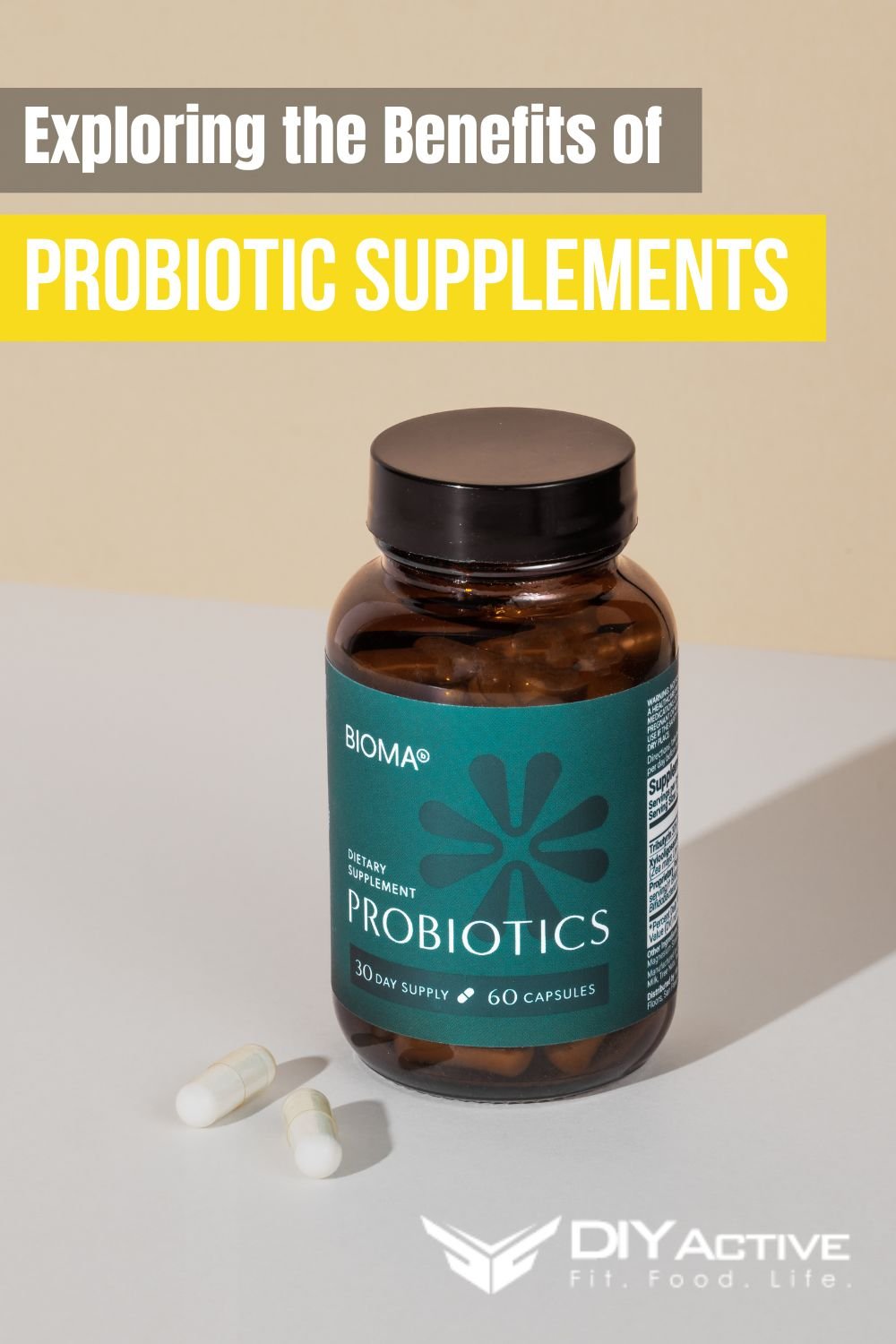
This post may contain affiliate content from which we earn a small commission at no additional cost to you. Read our full disclosure.
Unlocking the Power of Gut Health
In our increasingly health-aware society, gut health has risen to prominence as a key area of focus. Recent studies have underscored the critical role of a balanced gut microbiome in overall well-being, driving a surge in the popularity of supplements such as probiotics, prebiotics, and synbiotics. These supplements are now at the forefront of dietary health discussions, offering promising benefits for maintaining and enhancing gut health.
Probiotics, Prebiotics, and Synbiotics
What are Probiotics?
Probiotics are live microorganisms, primarily bacteria and sometimes yeast, that provide health benefits when consumed in adequate amounts. They are often referred to as “good” or “helpful” bacteria because they help keep the gut healthy.
Probiotics are found in fermented foods like yogurt, sauerkraut, and kimchi, as well as in dietary supplements. They work by balancing the gut microbiota—the community of microorganisms in the intestines.


Bioma Probiotics - 75% Off Discount Code
What are Prebiotics?
Prebiotics are compounds in food that induce the growth or activity of beneficial microorganisms such as bacteria and fungi. They are primarily non-digestible fibers or carbohydrates that act as food for probiotics.
Familiar sources of prebiotics include garlic, onions, leeks, asparagus, bananas, and whole grains. By feeding and fostering the growth of beneficial bacteria in the gut, prebiotics help improve digestion, enhance calcium absorption, and boost immune function.
What are Synbiotics?
Synbiotics are a combination of probiotics and prebiotics. They are specially formulated to ensure the survival and proliferation of beneficial bacteria in the gut. Synbiotics are designed to maximize the beneficial effects of both by combining the gut health-enhancing effects of probiotics with the fuel provided by prebiotics. They are becoming increasingly popular as a way to optimize gut microbiome health.
What combination is best for daily use?
For daily use, a combination of both probiotics and prebiotics (synbiotics) can be particularly effective in promoting gut health and overall well-being. This combination ensures the growth of beneficial bacteria and supports their survival and activity within the digestive system, maximizing health benefits.
When used together as synbiotics, the prebiotics essentially paves the way for probiotics to flourish by creating an optimal environment for them to thrive. This leads to several enhanced health outcomes, including:
- Improved Gut Health: Regular use of synbiotics can lead to better gut integrity, reduced symptoms of irritable bowel syndrome (IBS), and a lower incidence of diarrhea.
- Enhanced Immune Function: A well-balanced microbiome supports the immune system. Synbiotics can help strengthen this aspect, potentially reducing the frequency of infections and immune-related disorders.
- Better Nutrient Absorption: A healthy gut flora improves the breakdown and absorption of nutrients such as vitamins, minerals, and antioxidants, which are crucial for overall health.
- Mood Regulation: Emerging research links gut health to mood and mental health via the gut-brain axis. Synbiotics may play a role in enhancing mood and possibly reducing symptoms of depression and anxiety.
For daily use, look for synbiotic supplements that specify the strains and quantity of probiotics, as well as the type and amount of prebiotics. These products are formulated to ensure that the probiotics are effectively nourished by the prebiotics, leading to a more beneficial supplementation experience.
By choosing a high-quality synbiotic, individuals can maximize the potential health benefits of both probiotics and prebiotics in a single, convenient form.
Health benefits of probiotic supplements
Probiotic supplements offer several health benefits, including improved digestion, enhanced immune function, and reduced inflammation. Studies have shown that probiotics can help treat and prevent gastrointestinal issues such as irritable bowel syndrome, diarrhea, and constipation.
Additionally, probiotics may have beneficial effects on mental health, commonly referred to as the gut-brain axis.
How to Choose High-Quality Probiotics
Selecting the right probiotic supplement is crucial for ensuring effectiveness and achieving your health goals. Here are straightforward, practical tips to help you choose a high-quality probiotic:
- Check the CFU Count: Look for probiotics with a colony-forming unit (CFU) count ranging from 1 billion to 100 billion. A higher CFU count often means more effective bacterial support, especially if you are trying to address specific gastrointestinal issues.
- Identify the Strains: Different strains of probiotics serve different purposes. For general digestive health, strains like Lactobacillus and Bifidobacterium are commonly beneficial. If you have specific health concerns, such as allergies or IBS, look for clinically proven strains to address those issues.
- Look for Viability: The probiotics should be viable through the end of shelf life, not just at the time of manufacture. Check the packaging for storage information—some probiotics need refrigeration, while others are shelf-stable thanks to freeze-drying technology.
- Prebiotic Inclusion: Some probiotics include prebiotics. These are non-digestible fibers that feed the beneficial bacteria. A product that combines both (a synbiotic) can be more effective at improving gut health.
- Packaging and Brand Reputation: Choose products from reputable brands that invest in proper packaging to protect probiotics from heat, moisture, and light. Look for brands that have third-party testing and transparency about their ingredients and sources.
- Allergen Information: Make sure the probiotic doesn’t contain ingredients you are allergic to. This is particularly important if you have allergies to dairy, soy, or gluten, as these are common in many probiotic supplements.
By considering these criteria, you can select a high-quality probiotic that is effective, safe, and suited to your health needs. Remember, it’s always a good idea to consult with a healthcare provider before starting any new supplement, especially if you have underlying health conditions or are taking other medications.
Bioma
Bioma is an innovative dietary supplement crafted to enhance gut health and overall wellness. It integrates cutting-edge scientific insights with ingredients beneficial to the gut, offering a holistic approach to sustaining a healthy gut microbiome.


Bioma Probiotics - 75% Off Discount Code
Bioma features a distinctive mix of probiotics, prebiotics, and other advantageous elements specifically chosen to improve digestive health, immune function, and more:
- Optimizing Gut Health: Bioma provides a holistic approach to gut health by merging probiotics with prebiotics. These elements work together to foster a balanced gut bacterial environment, enhancing digestion, nutrient uptake, and overall health.
- Supporting Digestive Function: The specialized combination of probiotics and prebiotics in Bioma aids in maintaining a healthy digestive tract. By promoting the growth of beneficial gut bacteria and supplying necessary nutrients, Bioma ensures smooth digestion and consistent bowel movements.
- Boosting Immune Function: A well-maintained gut microbiome is essential for a robust immune system. The synergistic action of Bioma’s probiotics and prebiotics helps bolster immune defenses, protecting against harmful pathogens and boosting overall health and vitality.
- Balancing Gut Microbiota: Bioma’s carefully chosen probiotic strains, along with prebiotic fibers like Xylooligosaccharides (XOS), work to restore and maintain the balance of gut microbiota. This equilibrium is vital for optimal gut health and preventing digestive disturbances.
- Promoting Overall Well-being: Regular use of Bioma can lead to enhanced gut health, which positively impacts overall well-being. From improved digestion and nutrient absorption to stronger immune function, Bioma supports a healthy, vibrant lifestyle.
Adding Bioma to your daily regimen is an effective and straightforward way to focus on your gut health and experience the extensive benefits of a flourishing microbiome.
When to take probiotic supplements?
The best time to take probiotic supplements is either first thing in the morning or just before bedtime. Taking probiotics on an empty stomach ensures fewer stomach acids are present, allowing more probiotics to reach the intestines alive.
What is lactobacillus
Lactobacillus is a key type of probiotic commonly found in fermented foods like yogurt, sauerkraut, and kefir. It is one of the most beneficial bacteria in the group of lactic acid bacteria, known for its ability to convert sugars into lactic acid.


Bioma Probiotics - 75% Off Discount Code
Key Characteristics and Benefits:
- Acid and Bile Resistance: Lactobacillus is highly resilient and can survive the acidic environment of the stomach and the presence of bile in the small intestine. This resilience allows it to reach the gut, where it can colonize and exert its benefits effectively.
- Lactose Digestion: For individuals with lactose intolerance, Lactobacillus can be particularly beneficial. It helps break down lactose, the sugar found in milk, thus alleviating the symptoms of lactose intolerance, such as bloating, gas, and diarrhea.
- Digestive Health: Lactobacillus plays a crucial role in maintaining gut health. It helps balance the gut microbiota, preventing the growth of harmful bacteria and promoting a healthy digestive system. This balance is essential for proper digestion and can help prevent conditions like irritable bowel syndrome (IBS) and inflammatory bowel disease (IBD).
- Immune Function: Lactobacillus also supports the immune system by maintaining a balanced gut microbiota. A healthy gut barrier protected by good bacteria like Lactobacillus prevents pathogens from entering the bloodstream and causing infection.
Probiotic supplements for gut health
Probiotic supplements are essential tools for enhancing gut health. They introduce beneficial bacteria into the digestive system, which helps restore and maintain the natural balance of gut flora. This balance is crucial for several aspects of health.
Key Benefits of Probiotic Supplements for Gut Health:
- Restoration of Gut Flora: Daily stressors, poor diet, antibiotics, and other factors can disrupt the natural balance of bacteria in the gut. Probiotic supplements replenish these beneficial bacteria, restoring gut flora to a healthy state.
- Improved Nutrient Absorption: A balanced gut microbiome enhances the body’s ability to absorb nutrients from food. Probiotics can increase the efficiency of nutrient uptake, ensuring that the body gets the vitamins and minerals it needs from the diet.
- Enhanced Immune Function: A significant portion of the immune system is located in the gut. By maintaining a healthy gut microbiome, probiotics play a pivotal role in modulating and supporting the immune system, helping to protect against pathogens.
- Reduced Risk of Infections: With a stronger immune system and a balanced gut environment, the body is better equipped to fend off infections. Probiotics have been shown to reduce the frequency and severity of respiratory and gastrointestinal infections.
Incorporating probiotic supplements into your daily routine can thus be a valuable strategy for maintaining optimal gut health, enhancing overall well-being, and reducing the risk of various health issues linked to the digestive system. Whether you are looking to improve digestion, boost immune health, or simply maintain a healthy gut, probiotic supplements offer a practical and effective solution.
How long does it take for probiotics to work
The effects of probiotics on the gut microbiome can vary, but generally, short-term improvements such as reduced bloating and enhanced digestion can be noticed within a few days. It may take several weeks of consistent use for long-term benefits like immune support and reduced inflammation.
Probiotics and antibiotics
While antibiotics are great at fighting off harmful bacteria that cause infections, they can also wipe out the good bacteria that your gut needs to function correctly. This can throw off the balance of your gut microbiome, potentially leading to issues like diarrhea, upset stomach, or even yeast infections.


Bioma Probiotics - 75% Off Discount Code
Here’s how adding probiotics can help when you’re taking antibiotics:
- Restoring Balance: Taking probiotics during and after your antibiotic course helps replenish the good bacteria in your gut. This can help keep your digestive system running smoothly and reduce the chances of unwanted side effects from antibiotics.
- Timing is Key: To get the most out of probiotics without wasting their benefits, it’s best to take them a few hours before or after your antibiotic. This spacing out helps ensure that the antibiotics don’t kill the beneficial probiotics before they can do their job.
- Maintaining Gut Health: Adding probiotics can support your gut during this vulnerable time, aiding digestion, supporting your immune system, and helping to keep everything in balance.
Introducing probiotics alongside your antibiotic treatment is a smart move to counteract the potential downsides of antibiotics. It’s like giving your gut a helping hand to stay healthy and active even when dealing with an infection. Always check with your healthcare provider for recommendations on the best probiotic types and timing to suit your specific needs.
Final thoughts
Adding probiotics, prebiotics, and synbiotics to your daily regimen can profoundly impact your digestive health and overall well-being. Making informed choices about the right supplements, knowing the best times to take them, and understanding how they interact with other medications, such as antibiotics, are crucial to maximizing their benefits.
With a thoughtful approach, these beneficial microbes can significantly enhance your health, supporting everything from gut function to immune defense.
Grab the Largest Bioma Coupon Online Here:


Bioma Probiotics - 75% Off Discount Code
Disclosure: In the spirit of full disclosure, DIYactive.com may be compensated in exchange for featured placement of certain reviews or links on this website. View our full disclosure.





